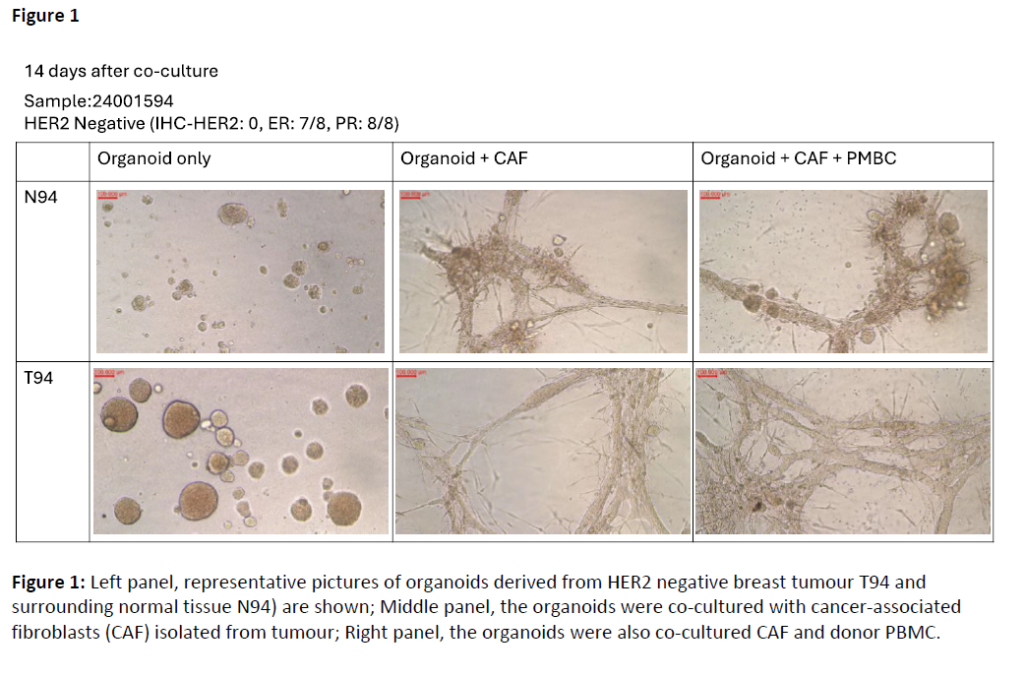Investigate the role of neutrophil in radioresistance in breast cancers
Primary supervisor: Anthony Kong, King’s College London
Secondary supervisor: Ilaria Malanchi, The Francis Crick Institute
Tertiary Supervisor: Rachel Evans, King’s College London
Project
A significant number of breast cancer patients develop brain metastasis (BM) or distant metastases, despite previous local radiotherapy and systemic treatments. For patients with oligometastasis, surgical excision or high dose radiotherapy such as radiosurgery (SRS) or stereotactic body radiotherapy (SBRT) to the metastases may help to achieve long-term local control. Following local treatments, patients will usually undergo further systemic treatments according to the breast cancer subtypes and previous treatments.
Patient-derived organoids (PDOs) have been shown to recapitulate patients’ tumours and could help to identify effective therapeutic regimens. We have been generating PDOs from primary breast cancer tissues to test for novel agents [1] and have also been co-culturing these PDOs with cancer-associated fibroblasts (CAF) isolated from tumours +/- PBMC (Figure 1) to assess immune markers in response to radiotherapy. Dr. Kong has initiated SOTO-BC study [IRAS 315793, Ref 24/NE/0022, chief PI: Dr. Kong, started Jan 25], a prospective observation study to correlate the treatment Sensitivity of PDOs with Treatment Outcomes in breast cancer patients with brain or extra-cranial metastases. SOTO-BC study aims to generate PDOs from resected or biopsied brain and/or extra-cranial metastasis and assess the potential of these PDOs in predicting treatment outcome in patients. The matched blood samples at different time points are also collected, which can be used to do co-culturing experiments.
Neutrophils represent the most abundant cells circulating in human blood and they are rapidly recruited in injured tissue and against microbial infection. They have emerged as one of the key protagonists of tumour associated inflammation and was implicated in all aspects of the tumorigenic cascade, from onset to metastatic dissemination as well as therapy resistance. Neutrophils behaviour can be highly plastic and broadly perturbed in consequence of changes during tumourigenesis [2].
The work from Dr. Ilaria’s lab have provided evidence of neutrophils’ importance in tissue repair after radiation injury to the lung, which also represents a link to their pro-metastatic activity (3). The unpublished work from the lab have also shown that neutrophils play a key role in determing cancer cells’ responses to radiotherapy.
Aim 1: To assess the role of neutrophils using PDOs and biological samples from SOTO-BC study
We will investigate changes in circulating neutrophils at baseline and after radiotherapy in samples obtained from metastatic breast cancer patients of SOTO-BC patients as per Dr. Ilaria’s previous work. In addition, we will co-culture a panel of breast cancer PDOs with CAF +/- PBMC (or isolated neutrophils) (Figure 1) to dissect the role of neutrophils in response to radiotherapy in primary and metastatic breast cancer PDOs.
Aim 2: To determine the role of neutrophils in radioresistance in PDO-derived xenografts
We will implant patient-derived organoids (PDOs) into immunodeficient mice, generating PDO-derived xenografts (PDOX). The PDOs can be implanted into mammary fat pad as well as other visceral sites to mimick metastasis. We can use both primary and metastasis PDOs (from SOTO-BC) for these experiments. We will assess the changes induced in neutrophils (neutrophils priming) in response to radiotherapy and correlate this neutrophils priming with the difference in radiosensitivity in these PDOX models. We will assess the impact of neutrophils depletion of radiosensitivity in the different PDOXs. We also aim to establish organoid model from those PDOXs and use them in co-culture with neutrophils primed by the different PDOXs to test the effect of radiotherapy resistance provided by differently primed neutrophils.
Aim 3: Assess immune changes of primary and metastasis tumours
To understand the immune changes of metastasis, paired primary and metastatic samples from SOTO-BC will be subjected to RNA-sequencing. The candidate will work with Dr. Sailem’s group to assess how treatment and metastasis the transcriptomic changes in these patients. The candidate will integrate the results from aim 3 with those from aim 1-2.
Aim 4: Characterise the tumour microenvironment phenotypes in primary and metastasis samples from SOTO-BC study
The candidate will work with the Marafioti and Sailem groups to design imaging experiments to profile the tumour microenvironment phenotypes including various immune cancer cell types including neutrophil markers [4-5] for the primary and metastasis samples obtained from SOTO-BC. They will utilise the Phenoimager HT multiplexed imaging system and CyTOF in these patients to correlate how the immune contexture changed with the genetic and phenotypic evolution in SOTO-BC. They will also determine how these phenotypes change in response to radiotherapy. The candidate will integrate the results from aims 1-3 with aim 4.

Candidate background
This PhD programme would suit a biomedical science graduate who is interested in pursuing a PhD in translational research using a multi-disciplinary approach with an aim to pursue an academic career. Ideally, the candidate has had previous laboratory experience through previous BSc and/or MSc projects but this is not essential as laboratory training will be provided
Potential Research Placements
- Heba Sailem, King’s College London
- Ilaria Malanchi, The Francis Crick Institute
- Teresa Marafioti, University College London
References
- Arshad M, Azad A, Feldinger K, Vigneswara V, Nafi SNM, Santo CD, Zuo J, Shaaban A and Kong A. Neratinib could be effective as monotherapy or in combination with trastuzumab in HER2 lower-expressing breast cancer cells and organoid models. Br J Cancer. 2024 Jun;130(12):1990-2002.
- Hedrick, C. C. & Malanchi, I. Neutrophils in cancer: heterogeneous and multifaceted. Nat. Rev. Immunol. 1–15 (2021) doi:10.1038/s41577-021-00571-6.
- Nolan, E. et al. Radiation exposure elicits a neutrophil-driven response in healthy lung tissue that enhances metastatic colonization. Nat Cancer 3, 173–187 (2022).
- Panayi C et al. Microenvironmental immune cell alterations across the spectrum of nodular lymphocyte predominant Hodgkin lymphoma and T-cell/histiocyte-rich large B-cell lymphoma. Front Oncol 2023 Oct 3:13:1267604. doi: 10.3389/fonc.2023.1267604. eCollection 2023.
- Sailem H et al. KCML: a machine-learning framework for inference of multi-scale gene functions from genetic perturbation screens. Mol Syst Biol. 2020;16(3):e9083.
